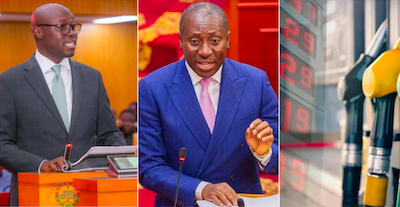Ghana’s New GH¢1 Petroleum Levy: Will It Solve the Energy Crisis or Raise Living Costs? These are the questions on the lips of many Ghanaians regarding diesel fuel prices in the country.
In a move sparking heated debate across Ghana, Parliament passed the Energy Sector Levies (Amendment) Bill, 2025, on June 3, 2025, introducing a GH¢1 per litre petroleum levy to address the nation’s chronic energy sector debt. The levy, aimed at ensuring a stable power supply and tackling the persistent issue of “dumsor” (power outages), has been presented by the government as a critical step toward energy sustainability.
Ghana’s New GH¢1 Petroleum Levy: Will It Solve the Energy Crisis or Raise Living Costs?
Ghana’s New GH¢1 Petroleum Levy, Finance Minister Dr. Cassiel Ato Forson Elaborates
Finance Minister Dr. Cassiel Ato Forson emphasized that the levy will fund liquid fuel for electricity generation, reducing reliance on tariff hikes. However, with public skepticism rising, many Ghanaians are questioning whether this new tax will truly stabilize the energy sector or simply inflate the cost of living. This article dives into the details of the Ghana petroleum levy 2025 impact on fuel prices, exploring its implications for consumers and the economy.
The government’s justification for the levy hinges on the remarkable performance of the Ghanaian cedi, which has gained over 40% against the US dollar in 2025, earning it the title of the world’s best-performing currency by Bloomberg in April. This surge, driven by gold windfalls, tight monetary policies, and IMF-backed reforms, has reduced Ghana’s foreign debt by nearly 150 billion cedis and lowered import costs, including for petroleum. Dr. Forson and Majority Leader Mahama Ayariga argue that the cedi’s strength will absorb the levy’s impact, ensuring fuel prices remain stable for now. They claim the Ghana petroleum levy 2025 impact on fuel prices will be minimal, as the cedi’s gains offset the additional cost at the pump.
However, the Minority Caucus in Parliament has fiercely opposed the levy, staging a boycott during the vote and labeling it “e-levy promax.” Critics, including MP Mr. Adomako Mensah, argue that the tax contradicts the National Democratic Congress (NDC)’s previous anti-tax stance when in opposition. They warn that, despite government assurances, the levy could indirectly drive up transport fares and the cost of goods, squeezing Ghanaians already grappling with economic pressures. Public sentiment on X echoes these concerns, with users like @BIGSTIF__ predicting higher transport costs and @zephcobby questioning the need for the levy given the cedi’s strength. The Ghana petroleum levy 2025 impact on fuel prices remains a contentious issue, as citizens fear hidden economic ripple effects.
The levy’s primary goal is to address the energy sector’s financial woes, which have long plagued Ghana with unreliable power supply. By funding liquid fuel for electricity generation, the government aims to reduce the frequency of dumsor and stabilize the grid. Posts on X, such as one from @SSDziedzorm, highlight that the levy targets energy sector debt without increasing electricity tariffs directly. Yet, skepticism persists about whether these funds will be managed transparently and effectively, given past challenges with energy sector financing. The Ghana petroleum levy 2025 impact on fuel prices could determine whether this policy delivers on its promise or adds to public distrust.
Economic analysts point out that the cedi’s current strength, while a boon, is partly tied to volatile factors like global gold prices, which could reverse in the future. If the cedi weakens, the levy’s impact on fuel prices could become more pronounced, potentially leading to higher costs for consumers. This uncertainty fuels public apprehension, as Ghanaians brace for possible indirect effects on transport, food, and other essentials. The government’s claim that the levy is “neutral” hinges on optimistic economic projections, but critics argue that such assurances often overlook long-term realities. The Ghana petroleum levy 2025 impact on fuel prices will be a key indicator of the policy’s true cost to citizens.
Public reaction on platforms like X reveals a mix of frustration and cautious hope. While some acknowledge the need to address energy sector debt, others see the levy as an unnecessary burden, especially following the recent cancellation of the e-levy. The debate underscores a broader tension between fiscal policy and public welfare, with Ghanaians demanding clarity on how the levy’s revenue will be used. For now, the government insists the Ghana petroleum levy 2025 impact on fuel prices will be cushioned, but public trust hinges on transparent implementation and tangible results in the energy sector.
As Ghana navigates this new fiscal measure, the Ghana petroleum levy 2025 impact on fuel prices will remain a focal point for both policymakers and citizens. The levy’s success will depend on whether it delivers a stable power supply without exacerbating economic pressures. For now, Ghanaians are left weighing the government’s promises against their lived realities, with many taking to social media to voice concerns and demand accountability. As the policy rolls out, its true impact on fuel prices, transport costs, and the broader economy will shape public opinion and, potentially, the nation’s economic future.



